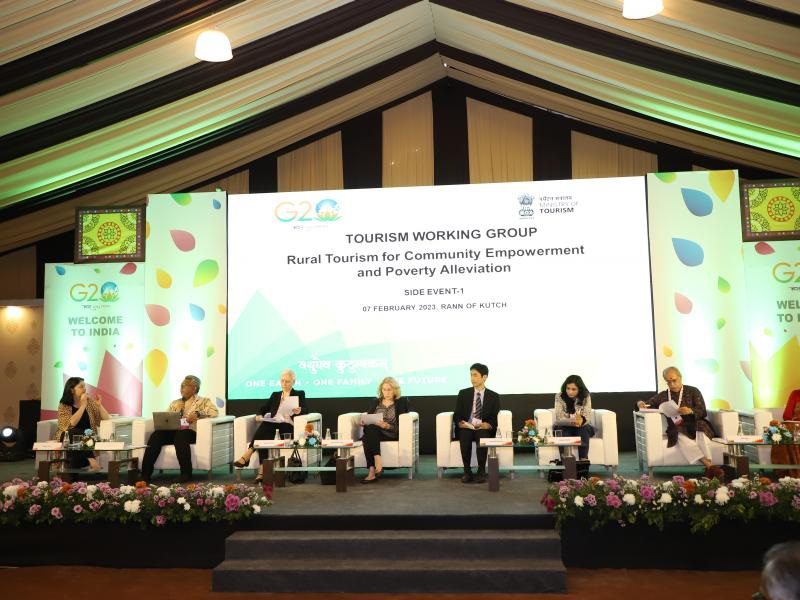 The first meeting of the G20 Tourism Working Group, held in the Rann of Kutch, India (7-9 February), was focused on the sector’s role in advancing the 2030 Agenda. UNWTO acted as a knowledge partner to the Indian presidency, providing the Goa Roadmap for Tourism as a Vehicle for Achieving the SDGs. A side event dedicated to rural tourism for community development and poverty alleviation was also held, highlighting opportunities for rural tourism and exploring the challenges facing the sector.
The first meeting of the G20 Tourism Working Group, held in the Rann of Kutch, India (7-9 February), was focused on the sector’s role in advancing the 2030 Agenda. UNWTO acted as a knowledge partner to the Indian presidency, providing the Goa Roadmap for Tourism as a Vehicle for Achieving the SDGs. A side event dedicated to rural tourism for community development and poverty alleviation was also held, highlighting opportunities for rural tourism and exploring the challenges facing the sector.
UNWTO shared it’s recently launched Tourism for Rural Development Programme and the Best Tourism Villages Initiative at the event. The findings presented were the result of an analysis of more than 200 candidacies by villages from around the world to the Best Tourism Villages Initiative and UNWTO Member States’ priorities and policies.
Representatives from Indonesia, Spain, Italy, Japan, the UN Environmental Program, the International Labor Organization, and the South Asia Women’s Network (SWAN) participated in discussions on how tourism policy can support rural development. The participants agreed that the sustainability of tourism in rural areas is dependent on a comprehensive planning strategy based on a multi-action, multi-stakeholder participatory approach. It was noted that rural tourism requires support from regional and local governments, the private sector, industry associations, civil society, communities, and tourists.
In 2021, the Ministry of Tourism of India formulated a National Strategy and Roadmap for the Development of Rural Tourism, recognizing the potential of rural tourism in the country. The event also included rural tourism cases from India, such as Astro-tourism, homestays, and women empowerment, as well as the Khonoma Village in Nagaland, which was selected by UNWTO to join the Best Tourism Villages Upgrade Programme.
The side event provided an opportunity to emphasize the importance of rural tourism for community empowerment and development. It stressed the need for a comprehensive planning strategy, the involvement of multiple stakeholders, and support from governments and the private sector to ensure the sustainability of rural tourism.
Overall, the G20 Tourism Working Group meeting and the dedicated side event on rural tourism reinforced the significance of rural tourism as a vehicle for achieving the SDGs and promoting community empowerment.
Written by: Matthew Thomas



















